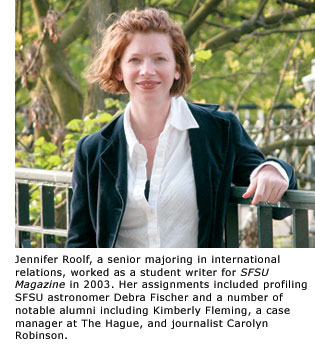 
In the Hub of The Hague "Good morning!"
"Goede morgen!"
"Ãa va bien?" My office mates greet each other brightly as they arrive at their desks. I'm not in a language lesson gone haywire, I'm working in one of the most diverse institutions in the world. At the United Nations' International Criminal Tribunal for the former Yugoslavia, I have 1,238 co-workers from 84 different countries. While French and English are the official languages of the Tribunal, Dutch, Serbo-Croatian, and many other languages echo the halls as well. Most business is conducted in English, and I rarely fall back on my smattering of high school French. Located in The Hague, the Netherlands, the Tribunal is responsible for indicting, trying and sentencing individuals accused of committing war crimes during the violent breakup of the afflicted Balkan republic. Last January, I arrived in the Netherlands to begin a 6-month internship in the Tribunal's section of Public Information Services, which issues press releases and legal documentation and maintains the Tribunal Web site. I contribute items for the internal news service, either writing stories about Tribunal business or culling articles from news wires. This means I get to keep tabs on world news and steal a front row seat in the dramatic theater of international law -- an enviable position for an international relations major with an interest in journalism. My supervisors are Christian, the chief of the section, and Jim, the Tribunal spokesman. A former Le Monde reporter, Christian is a tall, ebullient French gentleman with salt-and-pepper hair and a perpetually full bowl of peppermints on his desk. He has the direct friendliness of someone who truly believes that the world can be improved through human effort. Working with him, I have come to believe it, too. Jim is a compact, precise man with an unflappable demeanor that serves him well during press conferences. He has a classically dry, British sense of humor and enunciates tricky Serbo-Croat names with the composure of a BBC correspondent. Into the diplomatic realm of broad gestures and vague declarations, Jim brings the concentrated brightness of information and utility. He reminds me of my conviction that a free press is the basis of any decent society. Working in the press office is like feeling the pulse of the Tribunal. The surrender of an indicted Croatian general, the sentencing of a Serb paramilitary, or the appointment of a new judge to the Milosevic case all cause flurries of activity. The office television carries live video broadcasts from the courtrooms, and the voices of the courtroom translators have become as familiar to me as the voice-overs of action movie trailers. Every evening, I join the commuters who take to the streets en masse on bicycles. The Netherlands is famous for bicycling, and with good reason. Bike traffic is so heavy here that cyclists have their own roads and traffic signals. My local grocery store doesn't even have a parking lot for cars, just three bicycle racks. Unlike the harrowing obstacle course of San Francisco's streets, my commute here is a serene, effortless glide down a bike path in one of The Hague's many verdant parks. I'm living in Scheveningen, a quiet neighborhood bordering on the North Sea. (Pronounced skhav'-en-ing'-en, this name was used by the Dutch resistance to identify Nazi spies during World War II. Suspects were tricked into saying the name which is pronounced differently in German.) Old brick fishermen's houses line the narrow streets and willow trees lean over the canals where waterbirds nest. This summer, I will leave The Hague and travel through the Balkans before returning to SFSU to finish my senior year. My route will take me through Belgrade, Sarajevo, Zagreb, and along the Croatian coast. I don't think I'll turn up any fugitive war criminals, but I hope I will gain some new friends and a better understanding of this fascinating and troubled region. |